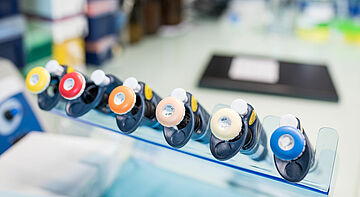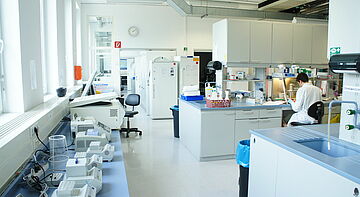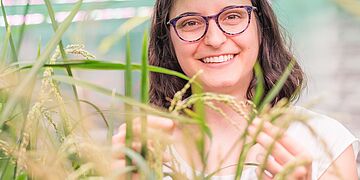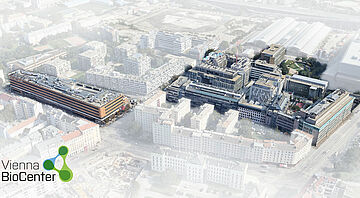
Success Story: SARS-CoV-2 Screening
Vienna BioCenter and COVID-19: The alliance of science
[Sept 2022] From individual gargling to nationwide screening, the Vienna COVID-19 Detection Initiative played a pivotal role in Austria’s pandemic response. Established in March 2020 at the Vienna BioCenter, the initiative helped protect individuals, secure jobs, and advance science. More than two years later, the team reflects on its successes, challenges, and extraordinary legacy.
Spring 2020 is part of a shared experience: from work and home to education and social life, COVID-19 swept away many certainties. When the World Health Organization declared a pandemic and Austria introduced its first national lockdown, researchers at the Vienna BioCenter (VBC) mobilized. They knew that without vaccines or treatments, the only way to control the virus was to detect and isolate cases. And they knew that on campus they had the skills, equipment, and infrastructure to do it – fast.
“At the end of February 2020, it became clear that COVID-19 was coming our way,” recalls Harald Scheuch, head of the Molecular Biology Service Facility (MBSF). “We looked at how testing was being done, found that PCR provided the most reliable method, and decided we could do this too.” Despite being in uncharted territory, the team had a clear idea of what they wanted to achieve. “We had the machines, we had the experience, and – at a time when laboratory consumables were in short supply – we even produced most of the materials ourselves,” said Robert Heinen, an RNA isolation expert from MBSF.
With funding from the Federal Ministry of Education, Science and Research and the Vienna Science and Technology Fund, volunteers from across VBC joined forces. They repurposed lab equipment, developed new detection methods, and pioneered gargling as an easy, comfortable alternative to nasal swabs. They built an app to handle samples and results, systems to anonymize testing and protect personal data. In April 2020, only one month later, the Vienna COVID-19 Detection Initiative (VCDI)* was launched.
Its aim was simple yet ambitious: to show that fast and affordable population-level screening could reduce the impact of COVID-19 on individuals, healthcare, and the economy. As demand for screening grew, so did the need to expand the VCDI screening program. To meet this need, two labs were set up in August 2020 and delivered affordable, sustainable COVID-19 detection at population scale. One lab, operated by the University of Vienna, ran nationwide COVID screenings of teachers and pupils from 245 schools across Austria. The lab also delivered twice-weekly screening for 2,000 health care workers in retirement and nursing homes, helping to protect residents and save lives.
The second lab moved to a new facility within the Vienna BioCenter Core Facilities (VBCF). In August 2020, Johanna Trupke joined to head up the lab, build the team, and upscale the screening program. Because of its unique role, VBCF was ideally placed to coordinate actions to keep the campus running. Daniele Soroldoni, VBCF Managing Director, said: “We provide scientific services to researchers on campus so that they can concentrate on innovative science. Our position as the central service provider meant we could coordinate this unprecedented response to COVID-19.”
Almost overnight, the small-scale operation moved to high-throughput mode. “It was a huge challenge,” Johanna says. “We moved from manual to robotic systems; we had to train staff, log and deliver results to end users, all the time keeping the operation running smoothly. But the biggest challenge was managing all this in such a short time; normally, you’d have six months to set up a new lab – we did it in four weeks.”
The laboratory was put to the test during acute COVID tests at Viennese schools commissioned by the Vienna Health Authority and the Federal Ministry of Education, Science, and Research in the fall of 2020. In just a few weeks, approx. 6000 gargle samples were analyzed, and suspected cases were quickly isolated. This direct measure to curb COVID19 infections in schools served as a pilot project for subsequent comprehensive screenings in schools. The VBCF's SARS-CoV2 screening laboratory was then able to focus on its core mission: to offer COVID-19 screening for employees of the VBC Campus.
Over 17 months of operation, the nine-strong COVID-19 screening team – alongside information management experts from VBCF – delivered 300,000 tests, detected 300 cases on the VBC campus, and prevented the uncontrolled spread of the virus. At its peak, the service performed 3,000 tests daily, reassuring staff, boosting morale, and fostering community cohesion among the 28 participating institutes and companies at VBC.
Like much of science, teamwork was central to the VCDI program’s success. “In a way, the whole operation was our major achievement,” says Johanna. “Certain steps were crucial, like the transition to high-throughput screening. And we were blessed with an amazing team – from the lab, IT, and information management to purchasing, health and safety, finance and administration. The expertise available on campus and the massive support of everyone involved were key to our success.”
By the time COVID-19 screening on the VBC campus closed in December 2021, it had shown how a concerted effort in a time of need could help safeguard individuals, their research, and their careers amidst a global pandemic. VCDI’s impact was not limited to staff at the Vienna BioCenter. “As a result of VCDI’s success, Vienna was the first major city to adopt this approach to testing, offering Vienna’s residents regular, free COVID-19 tests via Alles Gurgelt,” Daniele says. “I’m incredibly proud of the energy, ingenuity, and scientific excellence of everyone involved.”
*The Vienna COVID-19 Detection Initiative (VCDI) was a collaborative, inter-institutional effort of research institutes at the Vienna BioCenter and the University of Vienna. The Initiative’s success rests on the dedicated work of researchers and support staff across the VBC campus, including the Gregor Mendel Institute for Molecular Plant Biology (GMI), the Institute of Molecular Biotechnology Austria (IMBA), the Research Institute of Molecular Pathology (IMP), Max Perutz Labs Vienna, University of Vienna, and the Vienna BioCenter Core Facilities GmbH.
SCIENTIFIC CONTRIBUTIONS
Prevalence of RT-qPCR-detected SARS-CoV-2 infection at schools: First results from the Austrian School-SARS-CoV-2 prospective cohort study. Willeit P, Krause R, Lamprecht B, Berghold A, Hanson B, Stelzl E, Stoiber H, Zuber J, Heinen R, Köhler A, Bernhard D, Borena W, Doppler C, von Laer D, Schmidt H, Pröll J, Steinmetz I, Wagner M. Lancet Reg Health Eur. 2021 5:100086



